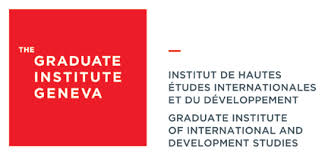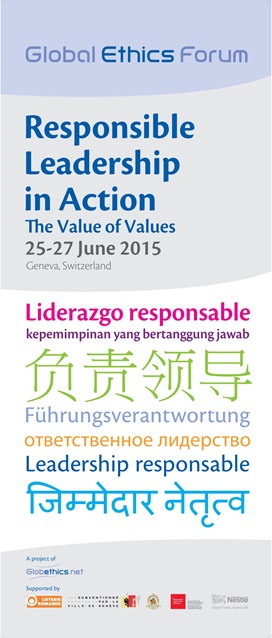
Global Ethics Forum
A Project of
Globethics.net
Responsible Leadership in Action
The Value of Values
25-27 June 2015, Geneva, Switzerland
I was delighted to receive a personal invitation from my good friend, Prof. Dr. Christoph Stuckelberger, Director and Founder of Globethics.net to participate at this conference and contribute to the discussions and deliberations at the workshop on “How to provide values-driven higher education.”
I think it is noteworthy if I first share with you the story of how was it that Christoph came to approach me to begin with.
On 9th of June I had posted a Blog on the GCGI website:
Values, Ethics, and the Common Good in MBA rankings: Where are they?
Prior to this I had also posted the following Blogs, amongst others:
Economics, Globalisation and the Common Good: A Lecture at London School of Economics
and Calling all academic economists: What are you teaching your students?
It seems Christoph had seen and read these Blogs and more importantly must have liked them!
Hence, on 9th of June I received an email and invitation to go to Geneva. Although, this was at a very short notice, nonetheless, I was able to accept this kind invitation.
I thoroughly enjoyed the conference. I found it to be a very rewarding and fruitful experience. I made a short presentation at the Values-driven higher education workshop on the first day and continued my dialogue and engagement into the second day. I will say a bit more on this later.

First I want to share with you a little story about when the Forum as a whole visited the Graduate Institute of International and Development Studies in Geneva on the afternoon of 25th of June.
This session was a public forum, open to all, including the general public, students, the youth and all other interested individuals. Present also were high level dignitaries from Geneva and senior city and university officials.
Interesting speeches on values-led education, business, trade, finance, etc were made (See the Forum’s Programme for more details*).
Now, my little story:
After the speeches and during the Q&A session, when invited by the moderator to make comments or ask questions, whilst I had no prior plan to ask any questions or make any comments, somehow, Christoph saw my raised hand.
I got up and allowed my heart, feelings and emotions to guide me in saying the following (as best I can remember now):
I said:
“When I look all around me, it breaks my heart to see despite so many gifts that we have been given in this life, to be happy, to lead a good and worthwhile lives, we have abused these gifts and have created such a miserable world, the world of multiple, continuing and deepening crises. Why?”
I then said:
“When I was a young lad, our elders used to tell us that education is a path to wisdom. Education will empower you to take action in the interest of the common good. It will enable you to build a better world, a world of peace, harmony and prosperity for all.”
I then continued that our elders also used to say that:
“Educators, too, are here to make a difference: To do something meaningful and to leave a legacy that guides future generations to take action in the interest of the common good, building a better world. Educational leaders should seek to create cultures where people learn together and lead together to create real and deep sustainable change.”
I then concluded my remarks by asking:
“Then why is it that with millions and millions more “educated” people in the last few decades, the world is in such a mess, misery and continuing into deepening crises, etc, etc?
What we see is not a sign of wisdom, but stupidity, ignorance and arrogance, I said. Don’t you think, it is time, we all come together and think very carefully, what education is, what has gone wrong and what ought to be done?”
Wow! The reaction to my comments in the hall, the continuing conversation during the reception afterwards and the stream of emails I have received since, has been very humbling to me. I firmly believe that this is a challenge to every one of us, a challenge that we must rise to if we are serious about values-driven education.
At this point I wish to return to the workshop and my presentation on the first day. I had ten minutes or so to say what I wanted to say. I had to be very selective and below is the gist of my presentation:
‘Values-led Education: The Path to Wisdom’
‘This presentation is dedicated to the youth of the world, our children and grand-children, who are the unfolding story of the decades ahead. May they rise to the challenge of leading our troubled world, with hope and wisdom in the interest of the common good to a better future’
I wish before saying anything else to share with you a few inspiring quotes to focus our minds, enabling us to continue more fruitfully; more rewarding:
“He that seeks the good of the many seeks in consequence his own good.” -St. Thomas Aquinas
"What is the essence of life? To serve others and to do good." -Aristotle
'UBUNTU': "I am because we are.”
“A generous heart, kind speech, and a life of service and compassion are the things which renew humanity.” -Buddha
‘We have to build a better man before we can build a better society.’-Paul Tillich
“Try not to become a man of success, but a man of value” -Albert Einstein
'The World is my country, all mankind are my brethren, and to do good is my religion’-Thomas Paine
Friends, today, our global family is facing a multitude of enduring and potentially catastrophic crises. For me, the answers lie in simplicity. There is no need to complicate matters further. After all, in the wise words of Leonardo da Vinci, “Simplicity is the ultimate sophistication.”
What are my educational/teaching values and ethos?
Let me share with you the philosophy, the vision and the values which underpin my thinking and have guided me in offering this suggested path for the common good. Here I am most humbly inspired by Lao Tzu,a mystic philosopher of ancient China, considered the founder of Taoism. He said:
Some say that my teaching is nonsense.
Others call it lofty but impractical.
But to those who have looked inside themselves,
this nonsense makes perfect sense.
And to those who put it into practice,
this loftiness has roots that go deep.
I have just three things to teach:
simplicity, patience, compassion.
These three are your greatest treasures.
Simple in actions and in thoughts,
you return to the source of being.
Patient with both friends and enemies,
you accord with the way things are.
Compassionate toward yourself,
You reconcile all beings in the world.
Now let me explain a bit more, as I strongly believe that unless you know the messenger well, first and foremost, then, his message would not make any sense at all.
To do this, the best I can do, is to quote you a passage from a book I wrote in 2005, well before the crash of September 2008 and very relevant to our discussion today:
“From 1980 onwards, for the next twenty years, I taught economics in universities, enthusiastically demonstrating how economic theories provided answers to problems of all sorts. I got quite carried away by the beauty, the sophisticated elegance of complicated mathematical models and theories. But gradually I started to have an empty feeling.
‘I began to ask fundamental questions of myself. Why did I never talk to my students about compassion, dignity, comradeship, solidarity, happiness, spirituality – about the meaning of life? We never debated the biggest questions. Who are we? Where have we come from? Where are we going?
‘I told them to create wealth, but I did not tell them for what reason. I told them about scarcity and competition, but not about abundance and co-operation. I told them about free trade, but not about fair trade; about GNP – Gross National Product – but not about GNH – Gross National Happiness. I told them about profit maximisation and cost minimisation, about the highest returns to the shareholders, but not about social awareness, accountability to the community, sustainability and respect for creation and the creator. I did not tell them that, without humanity, economics is a house of cards built on shifting sands.
‘These conflicts caused me much frustration and alienation, leading to heartache and despair. I needed to rediscover myself and real-life economics. After a proud twenty-year or so academic career, I became a student all over again. I would study theology, philosophy and ethics, disciplines nobody had taught me when I was a student of economics and I did not teach my own students when I became a teacher of economics.
‘It was at this difficult time that I came to understand that I needed to bring spirituality, compassion, ethics and morality back into economics itself, to make this dismal science once again relevant to and concerned with the common good.’
Towards an Education worth Believing In: What are the Big Questions?
What is education? What is knowledge? What is wisdom? What is a university? What is the source of true happiness and wellbeing? What is the good life? What is the purpose of economic life? What does it mean to be a human being living on a spaceship with finite resources? Is “sustainability” a buzz word? Is it simply fashionable to talk about a sustainable future, a sustainable education? How can the global financial system become more responsive and just? What paths can be recommended to shift the current destructive global political-economic order from one of unrestrained economic growth, profit maximisation and cost minimisation, targets and bonuses to one that embraces material wealth creation, yet also preserves and enhances social and ecological well-being and increases human happiness and contentment? How should we deal with individual and institutionalized greed? What are the requirements of a virtuous economy? What role should universities play in building an integrity-based model of business education? What should be the role of the youth? How might the training of young executives be directed with the intention of supplying insights into the nature of globalisation from its economic, technological and spiritual perspectives, to build supporting relationships among the participants that will lead towards action for the common good within their chosen careers? What needs to happen next for sustainability to become more integrated into the ethos of business schools? What distinct roles should students, business leaders and business schools themselves take in advancing this trend? Who is leading this agenda and what elements of best practice can be shared from their example?
I then concluded my presentation by quoting from a letter to The Times on 8 March 2011, highlighting the consequences of getting our values wrong:
Ethics boys
Sir, Around 1991 I offered the LondonSchool of Economics a grant of £1 million to set up a Chair in Business Ethics. John Ashworth, at that time the Director of the LSE, encouraged the idea but had to write to me to say, regretfully, that the faculty had rejected the offer as it saw no correlation between ethics and economics. Quite. Lord Kalms, House of Lords
Thus, friends, ladies and gentlemen, by now it must be clear that, given the state of our world today- a world of progress and poverty- the continuing and deepening global economic turmoil is merely a symptom of a much larger moral, spiritual and ethical crisis. In short, the world is facing a crisis of values; a crisis of trust.
I thank you for your attention and I am very much looking forward to further our dialogue at our next workshop tomorrow.
*Learn more about the Globethics.net, the Forum and see the Final Programme
Latest News - Global Ethics Forum 2015 - Globethics.net - Globethics.net

